GALLUP NEWS SERVICE
PRINCETON, NJ -- Al Gore's feature documentary, "An Inconvenient Truth," has given the global warming issue considerable public exposure since its premiere 15 months ago. Global warming's image as a "cause celeb" may have been secured when Gore accepted an Academy Award for his film last month before an adulatory crowd. Have Gore's and Hollywood's association with global warming done anything for the cause?
The answer to that question is not straightforward. The latest installment of Gallup's annual Environment poll, conducted March 11-14, 2007, documents a five-point increase since March 2006 -- from 36% to 41% -- in the percentage of Americans highly concerned about the issue. This builds on a 10-point increase that occurred between 2004 and 2006. The percentage now worried a great deal about global warming is essentially tied with the 40% seen in April 2000 for the highest level of recorded concern on this measure.
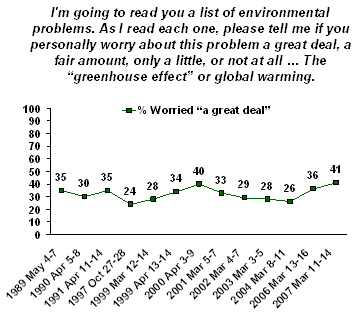
However, this sort of shift is not unprecedented. Gallup saw a similar rise between 1997 and 2000, spanning a high-profile debate over the Kyoto global warming international protocol during the Clinton administration. Overall concern fell from 40% in 2000 to 33% shortly after George W. Bush took office in 2001, largely because Republicans -- who may have been influenced by Bush's skepticism on the issue -- became less worried. But concern among both partisan groups has rebounded since 2004.
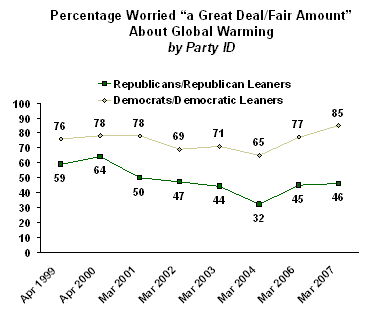
Public Feels Knowledgeable
The public's familiarity with global warming remains at a high ebb today. There has been no appreciable change over the past year in the percentage of Americans who consider themselves well informed about the issue, but this has risen steadily over the long term. Three-quarters of Americans now say they understand the issue either very well or fairly well. This is slightly higher than the 70% seen in 2005, and much greater than the 53% recorded in 1992.
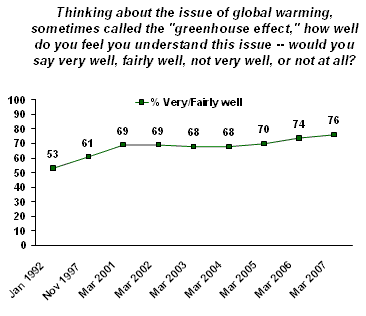
While less than a quarter of Americans (22%) today say they understand the issue very well, the majority (54%) understand it fairly well, leaving only 23% who admit to a weaker understanding.
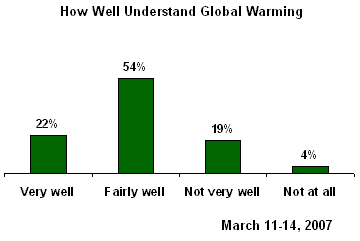
The percentage of Americans who believe the effects of climatic change have already begun to occur is unchanged compared with last year. Close to 6 in 10 (59%) believe the effects are now manifest. That is up from 54% in 2005, and 48% in 1997.
Another 3% believe the effects of global warming will start within a few years and 8% expect these changes to happen in their lifetimes. Only 19% believe the effects will be postponed to future generations, while just 8% are completely skeptical, saying the effects of global warming will never materialize.
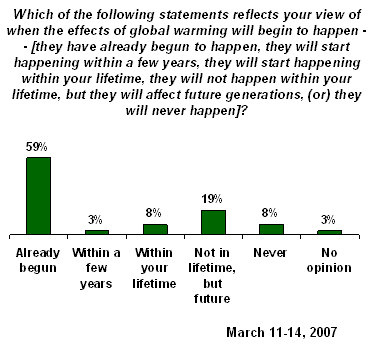
Despite growing public concern about the seriousness of global warming, Gallup has recorded minimal changes over the last several years in either Americans' perception of press coverage of the issue or their views on the causes of global warming.
Americans are divided roughly into thirds in terms of believing the press exaggerates the seriousness of the problem, underestimates it, or gets it about right. The percentage saying the press generally underestimates the problem has varied in a fairly narrow range from 32% to 38% since 2001.
On the central scientific debate over whether the documented rise in the Earth's temperature over the last century is more attributable to human activities or to natural causes, current opinion is nearly identical to where it stood when first measured in 2003. Sixty-one percent blame human activities, while 35% attribute the increase to natural causes.
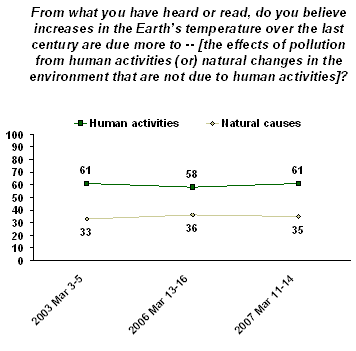
Gore's Impact
If Gore is looking for evidence in Gallup trends that he has been effective at raising public awareness of global warming, he might focus on the extent to which public opinion about the issue has changed since March 2005. That's the first Gallup environmental survey that not only predates the release of his film in May 2006, but reflects public opinion prior to the high-profile premiere of his film in January 2006. (However, this period also includes the event of Hurricane Katrina in late August 2005, which may also have contributed to subsequent changes in attitudes about global warming.)
Using March 2005 as the baseline, public familiarity with global warming grew six points during Gore's crusade, from 70% describing themselves very or fairly familiar with it in March 2005 to 76% in March 2007. The percentage saying the effects of global warming have already begun also increased from 54% to 59%. Gallup did not measure Americans' concern about global warming, per se, in 2005, but a separate question tracking public concern about the environment, more generally, shows an eight-point increase in concern over this period. Two other dimensions that haven't changed are perceptions of the accuracy of media coverage of the issue and beliefs about the causes of global warming. Although the latter question was not asked in 2005, that opinion on it has been unchanged since 2003 suggests there has been little movement over the entire period.
|
Recent Trends in Indicators of
|
||||
|
March
|
March
|
March
|
March
|
|
|
% |
% |
% |
% |
|
|
Worry great deal about global
|
28 |
-- |
36 |
41 |
|
Worry great deal about
|
34 |
35 |
40 |
43 |
|
Understand global warming
|
68 |
70 |
74 |
76 |
|
Effects of global warming
|
51 |
54 |
58 |
59 |
|
Think media underestimates
|
33 |
35 |
38 |
35 |
|
Global warming due to
|
61 |
-- |
58 |
61 |
Survey Methods
Results are based on telephone interviews with 1,009 national adults, aged 18 and older, conducted March 11-14, 2007. For results based on the total sample of national adults, one can say with 95% confidence that the maximum margin of sampling error is ±3 percentage points. In addition to sampling error, question wording and practical difficulties in conducting surveys can introduce error or bias into the findings of public opinion polls.
22. I'm going to read you a list of environmental problems. As I read each one, please tell me if you personally worry about this problem a great deal, a fair amount, only a little, or not at all. First, how much do you personally worry about -- [RANDOM ORDER]?
|
(sorted by "a great deal") |
|
|
Only a little/
|
|
% |
% |
% |
|
|
Pollution of drinking water |
58 |
24 |
17 |
|
Pollution of rivers, lakes, and reservoirs |
53 |
31 |
16 |
|
Contamination of soil and water by toxic waste |
52 |
28 |
20 |
|
Maintenance of the nation's supply of fresh water for household needs |
51 |
27 |
21 |
|
Air pollution |
46 |
33 |
20 |
|
Damage to the Earth's ozone layer |
43 |
27 |
30 |
|
The loss of tropical rain forests |
43 |
30 |
27 |
|
The "greenhouse effect" or global warming |
41 |
24 |
34 |
|
Extinction of plant and animal species |
39 |
30 |
31 |
|
Acid rain |
25 |
25 |
48 |
E. The "greenhouse effect" or global warming
|
Great
|
Fair
|
Only a
|
Not
|
No
|
|
|
% |
% |
% |
% |
% |
|
|
2007 Mar 11-14 |
41 |
24 |
18 |
16 |
1 |
|
2006 Mar 13-16 |
36 |
26 |
21 |
15 |
1 |
|
2004 Mar 8-11 |
26 |
25 |
28 |
19 |
2 |
|
2003 Mar 3-5 |
28 |
30 |
23 |
17 |
2 |
|
2002 Mar 4-7 |
29 |
29 |
23 |
17 |
2 |
|
2001 Mar 5-7 |
33 |
30 |
22 |
13 |
2 |
|
2000 Apr 3-9 |
40 |
32 |
15 |
12 |
1 |
|
1999 Apr 13-14 |
34 |
34 |
18 |
12 |
2 |
|
1999 Mar 12-14 |
28 |
31 |
23 |
16 |
2 |
|
1997 Oct 27-28 |
24 |
26 |
29 |
17 |
4 |
|
1991 Apr 11-14 |
35 |
27 |
22 |
12 |
5 |
|
1990 Apr 5-8 |
30 |
27 |
20 |
16 |
6 |
|
1989 May 4-7 |
35 |
28 |
18 |
12 |
7 |
28. Next, thinking about the issue of global warming, sometimes called the "greenhouse effect," how well do you feel you understand this issue -- would you say very well, fairly well, not very well, or not at all?
|
|
Very
|
Fairly
|
Not very
|
Not
|
No
|
|
% |
% |
% |
% |
% |
|
|
2007 Mar 11-14 |
22 |
54 |
19 |
4 |
* |
|
|
|
|
|
|
|
|
2006 Mar 13-16 |
21 |
53 |
20 |
6 |
* |
|
2005 Mar 7-10 |
16 |
54 |
24 |
6 |
* |
|
2004 Mar 8-11 |
18 |
50 |
26 |
6 |
* |
|
2003 Mar 3-5 |
15 |
53 |
27 |
5 |
-- |
|
2002 Mar 4-7 |
17 |
52 |
25 |
6 |
* |
|
2001 Mar 5-7 |
15 |
54 |
24 |
6 |
1 |
|
1997 Nov 6-9 |
16 |
45 |
28 |
10 |
1 |
|
1992 Jan |
11 |
42 |
22 |
22 |
3 |
29. Which of the following statements reflects your view of when the effects of global warming will begin to happen -- [ROTATED: they have already begun to happen, they will start happening within a few years, they will start happening within your lifetime, they will not happen within your lifetime, but they will affect future generations, (or) they will never happen]?
|
|
|
|
|
Not within lifetime,
|
|
|
|
% |
% |
% |
% |
% |
% |
|
|
2007 Mar 11-14 |
59 |
3 |
8 |
19 |
8 |
3 |
|
|
|
|
|
|
|
|
|
2006 Mar 13-16 |
58 |
5 |
10 |
15 |
8 |
3 |
|
2005 Mar 7-10 |
54 |
5 |
10 |
19 |
9 |
3 |
|
2004 Mar 8-11 |
51 |
5 |
12 |
18 |
11 |
3 |
|
2003 Mar 3-5 |
51 |
6 |
12 |
17 |
10 |
4 |
|
2002 Mar 4-7 |
53 |
5 |
13 |
17 |
9 |
3 |
|
2001 Mar 5-7 |
54 |
4 |
13 |
18 |
7 |
4 |
|
1997 Nov 6-9 |
48 |
3 |
14 |
19 |
9 |
7 |
30. Thinking about what is said in the news, in your view is the seriousness of global warming -- [ROTATED: generally exaggerated, generally correct, or is it generally underestimated]?
|
|
Generally
|
Generally
|
Generally
|
No
|
|
% |
% |
% |
% |
|
|
2007 Mar 11-14 |
33 |
29 |
35 |
4 |
|
|
|
|
|
|
|
2006 Mar 13-16 |
30 |
28 |
38 |
4 |
|
2005 Mar 7-10 |
31 |
29 |
35 |
5 |
|
2004 Mar 8-11 |
38 |
25 |
33 |
4 |
|
2003 Mar 3-5 |
33 |
29 |
33 |
5 |
|
2002 Mar 4-7 |
31 |
32 |
32 |
5 |
|
2001 Mar 5-7 |
30 |
34 |
32 |
4 |
|
1997 Nov 6-9 ^ |
31 |
34 |
27 |
8 |
|
|
|
|
|
|
|
^Based on half sample |
||||
31. And from what you have heard or read, do you believe increases in the Earth's temperature over the last century are due more to – [ROTATED: the effects of pollution from human activities (or) natural changes in the environment that are not due to human activities]?
|
Human
|
Natural
|
No
|
|
|
% |
% |
% |
|
|
2007 Mar 11-14 |
61 |
35 |
5 |
|
|
|
|
|
|
2006 Mar 13-16 |
58 |
36 |
6 |
|
2003 Mar 3-5 |
61 |
33 |
6 |
